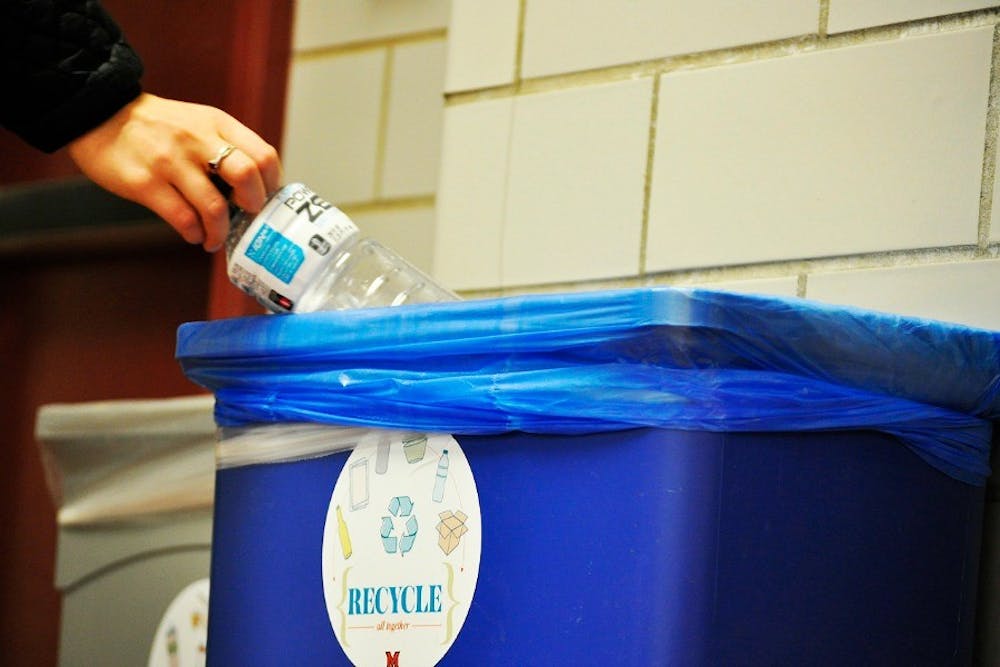By Grace Moody, News Editor
Studies show Miami University students are not effectively using the recycling bins placed throughout campus, and the long-term consequences could be devastating.
On April 6, the department of sustainability performed a test to properly analyze the amount of trash and recycling managed at Miami. Yvette Kline, the director of sustainability and energy conservation, led the test to measure the amount of trash compared to recyclables on campus.
Rumpke, the company that holds Miami's waste management contracts, weighs one week's worth of campus trash and recycling during July, November, February and April.
Kline used the weights from the week of April 6 to approximate the total annual tonnage of Miami's waste. She found that there were 51.82 tons of trash and 20.25 tons of recycling for that week.
Based on these weekly amounts, Kline projected the university accrues 1,749 tons of trash and 683 tons of recycling on an annual basis.
Kline reported these figures do not include Miami's organic waste. These calculations come from the trash and recycling that go into hauling trucks from dumpsters around campus. She described this as "household" trash and recycling. With this in consideration, the "household" recycling rate from the week of April 6 was 28 percent.
In addition to this trash test, Miami's eco representatives performed trash audits in seven residence halls this school year and found that 18-36 percent of items thrown away in trash cans could have been recycled instead.
Rob Abowitz, a staff member of residence life, led the trash audit. Residence halls that performed the trash audit were chosen based on having a variety of types of halls, storage space availability and recommendations from the Housing, Dining, Recreation and Business Services staff, according to Arbowitz.
The results were used as an educational tool for both residence halls and Miami as a whole. The seven residence halls used for the test were Brandon, Hillcrest, Scott, Minnich, Emerson, Morris and Hahne. Of these seven, Hahne Hall had the highest amount of trash that could have been recycled: 36.7 percent of items in the trash should have been in the recycling bin. Brandon Hall had the lowest percentage with 18.5 percent.
According to Amélie Davis, assistant professor of Geography/Institute for the Environment and Sustainability, while the fact that the amount of recycled waste is less than half of the amount of the trash waste, doesn't surprise her, she knows that the recycling should be greater.
"There's no excuse to put a recyclable product in the trash if there's a recycling bin right there," Davis said.
Enjoy what you're reading?
Signup for our newsletter
Davis described the harm of having recyclables, particularly plastics, in the trash instead of recycling.
"Use in everyday products is also what makes plastics problematic for the environment because when they do biodegrade, they become these little bits of plastic and then a lot of them have ended up in waterways and then the oceans," Davis said.
This then creates danger for wildlife, as they will eat the plastic in the ocean, Davis explained.
Plastics, which have no nutrients for animals such as turtles, birds and fish, are unhealthy for them. Davis mentioned that because of this, some people fear that these plastics could in turn end up in the human food chain.
Anna Ginsky, a graduate student in the department of sustainability and president of Miami's Green Team, works toward awareness and improvement around campus for recycling initiatives. She said having better and more informational campaigns would make a significant difference in student recycling. She also said working with other campus environmental awareness clubs could increase success.
"There are a handful of green organizations that pretty much work independently," Ginsky said. "If we have more collaboration we could reach a broader audience."
Ginsky spoke on the ease of recycling on campus through Miami's recycling and waste management system.
"Students make a lot of mistakes with sorting their recycling," Ginsky said. "It comes down to student willingness to participate in the program."
Due to mistakes that students make with sorting their trash, more information is a part of the program that Miami's recycling and waste management system intends to improve. She suggested having residence life inform residents of recycling rules at the beginning of each school year.
First-year student Jessie Beigel is an advocate for environmental precautions such as litter, recycling and composting. She recycles in her residence hall and also has compost piles.
"I kind of feel like we're living in a big garbage can," Beigel said. "As soon as you throw litter out your window, eventually the rain carries it and it goes to the oceans."
Beigel picks up trash and throws it out around campus if she sees it while walking. She tries her hardest to convince her peers and friends to do the same, along with recycling, not littering and making compost piles.
"I just do my part and try and persuade other people to take care of the only home we have."




